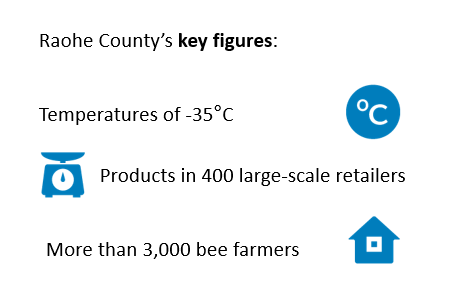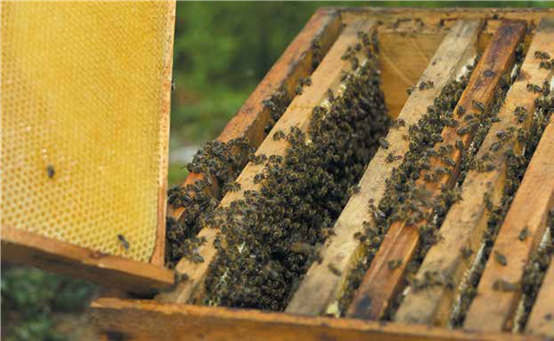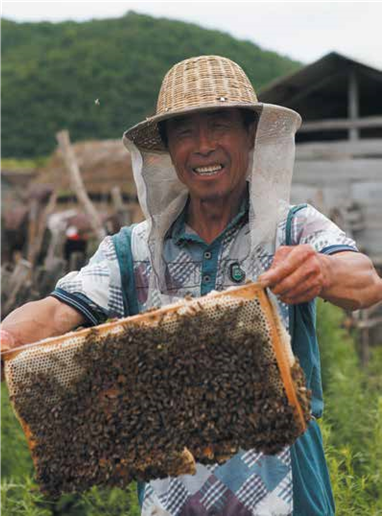
A beekeeper in Henan Village, Raohe County checks on her hives. Thanks to the county's cooperative, beekeepers are now able to access the proper equipment.
Black honeybee is a subspecies of the apis mellifera, or European honeybee. At the beginning of the last century, the bee species was raised along the banks of the Ussuri River in Raohe County, Heilongjiang Province of China.

A nationally protected species in China, the black honeybee is able to withstand the area's cold climate, namely temperatures that can drop to -35°C. With strong reproductive capacity and immune systems, the bees are relatively large pollinators that happen to inhabit a region rich with wild flowers.
Nevertheless, for many years, apiaries in the area could not spawn a large-scale industry. This was due to few means of transportation, a sparse population and the size and elevation of the Lesser Khingan Mountain Range, which covers 230,758 sq km and reaches heights of 1 km above sea level.

The black honeybee is a nationally protected species in China. It is able to withstand the area’s cold climate, even when temperatures drop to -35 °C.
New modes of production
When Yang Shaowu, Chairman of Beichun, an agricultural produce development company, first came across the species, beekeepers were mostly managing their businesses at the household-level. It was typical for beekeepers to only possess a few dozen hives each and they would travel all year round to keep up with flowering phases. Quantity and quality of their produce would depend on various factors, including beekeeper experience and business integrity, and would often be vulnerable to fluctuations due to weather changes. Aggressive pricing competition also occurred, which meant that farmers struggled to make a living for themselves.
In 2008, Yang partnered with Li Dahai, a local professional beekeeper whose family had raised bees for generations. Together, they established the Xinhe Northeast Black Honeybee Cooperative in order to modernise the region's practices, increase production and regulate local farms.
Selling their produce in a unified way, the cooperative identifies locations for beehives, organises transport for equipment, and supplies production materials such as beekeeping equipment and bee medicine. It also adopts and implements strict ISO international quality standards, regulations for technical operations, and manages packaging, price setting, transport and store logistics. Beichun Agricultural purchases their produce from the cooperative at a stable price, which has helped to relieve concerns about the cooperative's sales.
The cooperative also enabled a culture of upskilling by providing various training courses for beekeepers, helping them diversify and strengthen their skills and learn how to increase production.
The cooperative also partnered with a trade company to process its honey and other raw materials. The company achieves excellence by ensuring its products are in accordance with the ISO9001:2000 international quality management system throughout the whole process.
By 2014, the trade company had sales staff in 27 provinces across China. The company's product shipments have made their way into more than 400 large retailers and supermarkets. It also sells products at more than 800 convenience stores across the country, as well as its own flagship stores.

Workers at the Xinhe Northeast Black Honeybee Cooperative process “propolis”, or bee glue, which can be used as both a sealant in beehives and in Chinese medicine. The cooperative processes a variety of bee products.
Bees and webs
While Yang had achieved success through traditional channels, he soon learned that e-commerce was a key opportunity.
In 2010, products bearing the Beidahuang logo began to appear online. Beichun Agricultural started working with large online retailers in China. Sales volumes increased as a result of the company’s evolving direct-to-customer sales models.
By working with an e-commerce platform's efficient logistics network, this process enables customers to receive their products very quickly. Thanks to Beichun topping the website's honey sales for many years, the company became its poverty alleviation partners in the first half of 2016.
It has implemented several poverty alleviation models that have helped to improve different conditions for local impoverished households. For some households, the models have provided jobs, while for others, they have provided them with production materials and allowed them to sell their produce to the cooperative with an agreed price. For household members who do not possess the ability to work, the Raohe County government provides them with production materials and Beichun helps them raise their bees and shares dividends with them.
The power of collaboration
To further help alleviate poverty in the region, the e-commerce platform joined forces with local farmers to enhance marketing efforts. The company reported that, in July 2016, it managed to net more than RMB400,000 for beekeepers using an online campaign, while also drawing in RMB12,000 in donations for poor households.
Thanks to its partnership with the e-commerce platform, Beichun’s sales volume increased from RMB6-7 million in 2015 to RMB15 million in 2016, and then to RMB20 million in 2017. By the end of 2020, the annual sales of Beichun’s black bee products had exceeded RMB30 million, with most of that value being driven by online sales.
Encouraged by these figures, Beichun and the e-commerce platform created an agricultural demonstration area in the province in April 2022 to showcase apiculture, another term for beekeeping. This demonstration area enabled a holistic effort to raise brand awareness under various guises, ranging from tourism to charity fundraising.

Li Hongqing, a beekeeper in Raohe County, holds up a hive frame containing Northeast China's black honeybees.
Sixty-year-old Li Hongqing suffers from femoral head necrosis and has not been able to take on heavy farming work since his 30s. To support his family, Li decided to become a bee farmer after learning that the work does not require too much physical work. However, he was struggling to make profits due to lack of training and relevant business knowledge. Things soon started to change for the good after he joined the Xinhe Cooperative in 2008. The cooperative's biannual bee farmers' conference and annual technical training made it possible for Li to communicate well with other apiaries and improve his skills. As he stated in an interview in July 2017, Li was satisfied with his annual income between RMB20,000-30,000 earned from beekeeping. This income was not high, but it was enough for Li to support himself and his family.
Lin Hua is another one of the more than 3,000 apiaries in Raohe. After receiving financial and technical support from the cooperative, he expanded the scale of his beehives to more than 100. As he gradually got on the right track, his annual income grew to nearly RMB100,000 and he was able to lift himself above the poverty line in 2016.
Leading agribusinesses that engage particularly in the development of local specialty products have the potential to open up a broader market for such products and the regions where the products come from. While these products help to meet consumer demand, they also help to establish a sustainable consumer model of poverty relief for China.
For more information, please contact WFP China COE (wfpcn.coe@wfp.org)
Category
Contributor
Northeastern Black Bee Honey Creates E-commerce Buzz
Country
Technical Solution

